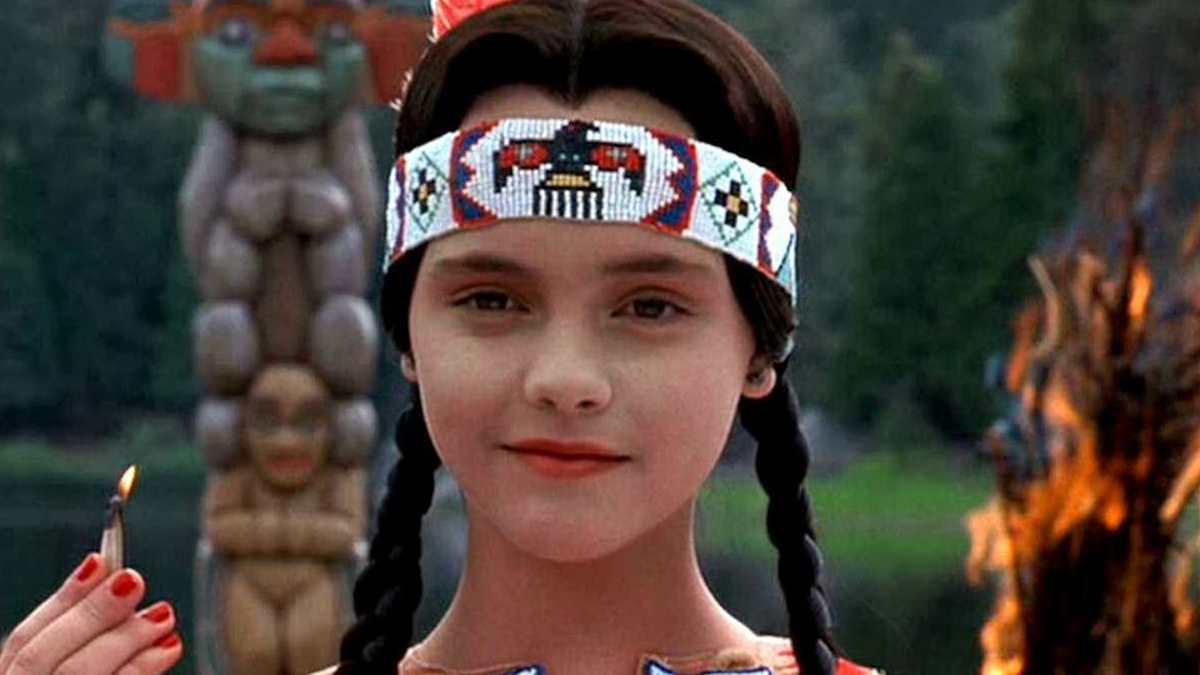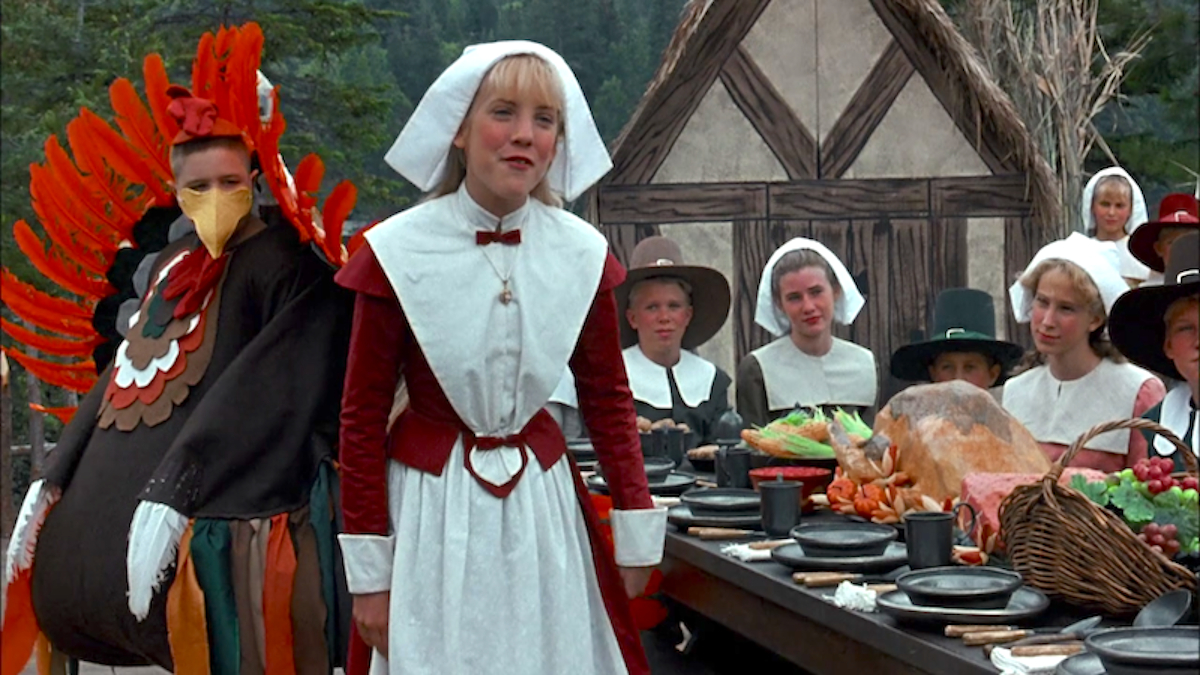
As a movie critic with roots deeply embedded in the American soil and a history of celebrating holidays as diverse as my own family, I can confidently say that “Addams Family Values” is the pièce de résistance when it comes to Thanksgiving-themed films. This 1993 gem doesn’t just tickle our funny bones or scare us with its gothic charm; it delves deep into the heart of the holiday, exposing its complexities and contradictions in a way that only this eccentric family can.
It’s often noted that Thanksgiving isn’t as frequently depicted in movies compared to other holidays. However, there are some fantastic films related to this season. Among them, a movie that captures the essence of Thanksgiving (if it indeed has one) is not instantly recognized due to its title not being explicitly about Thanksgiving. Instead, the movie that delves deeply into the history, meaning, and underlying tensions associated with Thanksgiving is the 1993 comedy sequel “Addams Family Values.
Here’s why:
It Deals With Complicated History The Best Way
Few people still deny that Thanksgiving carries a complex past. This is why many families have opted for alternative ways to celebrate, moving beyond the traditional ‘Indians and Pilgrims’ theme, which feels outdated or awkward today. Notably, the film “Addams Family Values” stands out as one that best portrays this reality and satirically dismantles the overly antiquated images associated with Thanksgiving.
In the sequel, most events unfold during summertime, but a significant portion highlights Thanksgiving in a side story focusing on Wednesday Addams (Christina Ricci) and Pugsley Addams (Jimmy Workman), who are sent to the exclusive Camp Chippewa by their malicious nanny Debbie (Joan Cusack). Here, Wednesday, Pugsley, and their peculiar friend Joel (David Krumholtz) find themselves compulsorily involved in a bizarre Thanksgiving play named “A Turkey Named Brotherhood,” directed by camp leaders Gary (Peter MacNicol) and Becky (Christine Baranski).
In this setting, director Barry Sonnenfeld and writer Paul Rudnick veer towards societal critique, as Gary and Becky distribute roles for their production in a manner that appears to follow unspoken socio-ethnic guidelines. The privileged, Caucasian/aristocratic campers, like wealthy Amanda Buckman (Mercedes McNab), are cast as Pilgrims, whereas children who are ethnically diverse, differently abled, or simply considered “different,” are assigned to portray the Native American attendees at the first Thanksgiving gathering.

The message becomes crystal clear when Wednesday ultimately reverses the situation in the play, catching the Pilgrims off guard with a fierce assault. In a memorable soliloquy directed at her adversary, Amanda, Wednesday explains that her knowledge of the unfortunate fate of Native American Tribes prevents her from portraying the idyllic image of Thanksgiving – instead, she chooses to depict how the Indians might have acted when they had the opportunity.
The depth of subject matter in these family films, even those with a PG-13 rating, is noteworthy. However, what sets Sonnenfeld’s Addams Family movies apart for many years now, and has been cherished by millions of children, is the delicate balance between horror, humor, and sharp social critique. The Camp Chippewa sequence and its Thanksgiving play are iconic moments that have become a big part of childhood memories for many. In fact, “A Turkey Named Brotherhood” ranks among the most renowned scenes related to Thanksgiving in movie history.
Thanksgiving Is All About Family Values (And Tensions)

In a slightly subdued tone, the movie “Addams Family Values” skillfully narrates the typical family disagreements that often escalate during Thanksgiving, while also touching upon the traditional themes associated with this holiday.
In “Addams Family Values,” the narrative unfolds as a scheming widow named Debbie (Cusack) targets Uncle Fester (Christopher Lloyd), aiming to seize the Addams Family’s fortune. Her strategy involves disguising herself as their sunny, energetic nanny while subtly creating rifts within the family. She arranges for the children to be sent away at camp, convinces Fester to alter his demeanor and appearance, and ultimately drives a wedge between him and his brother Gomez (Raul Julia), causing them to drift apart. In a bizarre twist, Debbie subjects the family to an unusual form of therapy, securing them in electric chairs and compelling them to listen to her ‘tragic tale’ of offing all her past spouses. However, the Addams Family eventually reconnect when their baby boy, Pubert, accidentally causes Debbie herself to be electrocuted in the chair.
Is there any connection between what we’ve been discussing and Thanksgiving? At first glance, it may not seem so, but the film also has a subplot related to Thanksgiving: the idea of sharing a meal as a family, and the underlying tensions and conflicts, mirrors Debbie and Fester’s journey, and also serves as a thoughtful commentary on the complexities of dealing with family, highlighting both the challenges and the shared values that bind us to our kin.
That’s a “Thanksgiving lesson” if ever there was such a thing: a reminder that our family may be weird, demented, or downright psychotic, but they’re the tribe we belong to, for better or worse. Thanksgiving 2024 will likely be a uniquely trying time for quite a few families – Addams Family Values is a peace offering that everyone at the table can enjoy.
Addams Family Values is now streaming on Paramount+ and Pluto TV.
Read More
- Forza Horizon 5 Update Available Now, Includes Several PS5-Specific Fixes
- Gold Rate Forecast
- ‘The budget card to beat right now’ — Radeon RX 9060 XT reviews are in, and it looks like a win for AMD
- Masters Toronto 2025: Everything You Need to Know
- We Loved Both of These Classic Sci-Fi Films (But They’re Pretty Much the Same Movie)
- Valorant Champions 2025: Paris Set to Host Esports’ Premier Event Across Two Iconic Venues
- Karate Kid: Legends Hits Important Global Box Office Milestone, Showing Promise Despite 59% RT Score
- Eddie Murphy Reveals the Role That Defines His Hollywood Career
- Discover the New Psion Subclasses in D&D’s Latest Unearthed Arcana!
- Street Fighter 6 Game-Key Card on Switch 2 is Considered to be a Digital Copy by Capcom
2024-11-25 01:09